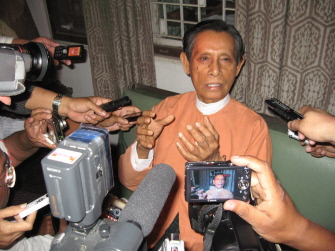Myanmar frees major opposition leader
YANGON: The deputy leader of Myanmar's pro-democracy party was released by the military regime Saturday after almost seven years in detention and said he hoped the party's leader Aung San Suu Kyi would also soon gain freedom.
The release of the 82-year-old Tin Oo, who helped found the National League for Democracy with Suu Kyi, comes shortly before a U.N. envoy visits the country.
Speaking after police officers entered his house and announced his release, a defiant Tin Oo told reporters, "I will continue to work for democracy."
Tin Oo, whose latest term of detention expired Saturday, had spent nearly seven years in prison and under house arrest. The junta renewed his detention on an annual basis since his arrest in 2003.
Wearing the peach-colored traditional jacket of the league, Tin Oo said he was "very hopeful" Suu Kyi would soon be released, noting that in 1995 he was released from an earlier stint in prison not long before Suu Kyi herself was set free.
The United Nations' special envoy to Myanmar, Tomas Ojea Quintana, is to arrive in Myanmar on Monday to evaluate its progress on human rights issues. Human rights groups say the junta still holds some 2,100 political prisoner including Suu Kyi.
Tin Oo was arrested along with Suu Kyi on May 30, 2003, when a pro-government mob attacked their motorcade as they were making a political tour of northern Myanmar.
Four people were killed and 50 injured in the incident, according to official figures, but dissidents say the death toll was much higher. Hundreds of members and supporters of Suu Kyi's party were arrested, but none of the attackers was ever brought to court.
Tin Oo was initially held in Kalay prison, known for its harsh conditions, about 430 miles (700 kilometers) north of Yangon. Since February 2004 he has been under house arrest in Yangon. His telephone was cut off, he was not allowed to receive visitors and relatives said he had been denied regular medical checkups.
A highly decorated commander, Tin Oo rose to the rank of general and served as defense minister during the 26-year socialist regime of deceased dictator Ne Win. He was forced into retirement in 1976 and imprisoned for three years for alleged involvement in a plot to kill Ne Win. But it is widely believed that Ne Win wanted to eliminate the highly popular Tin Oo as a potential rival.
Tin Oo, who spent another three years in prison after the founding of Suu Kyi's league, is respected by many of his party members for his outspokenness and courage.
A trusted ally to Suu Kyi, Tin Oo accompanied the party leader on her travels around the country to rally for democracy.
On Friday, Suu Kyi's party called for Tin Oo's unconditional release, saying he had been detained because of his "unrelenting efforts for the emergence of democracy and human rights in the country."
Home Minister Maj. Gen. Maung Oo reportedly said last month that Tin Oo would be freed in February and Suu Kyi would be released in November. His comments were made during remarks to local officials in central Myanmar and reported by the U.S.-government backed Radio Free Asia and other media, and could not be independently confirmed.
The junta took power in 1988 after violently suppressing mass pro-democracy protests. It held general elections in 1990, but refused to recognize the results after Suu Kyi's party won a landslide victory.
Nobel Peace Prize laureate Suu Kyi, the party's secretary-general, has been detained for 14 of the past 20 years. Her house arrest was extended in August by an additional 18 months, and there is no indication that she will be allowed to participate in this year's long-awaited elections.
Myanmar's junta chief, Senior Gen. Than Shwe said Friday that the free and fair elections would be held "soon" but gave no date.
The regime still needs to pass necessary election laws to pave the way for the vote and then set a date.
Suu Kyi's party has not yet decided whether to take part in the elections. The party says the new constitution of 2008 is unfair and will perpetuate military rule — a claim backed by international rights groups. The constitution guarantees that 25 percent of parliamentary seats will go to the military. It also has a clause that would effectively bar Suu Kyi from holding office.






